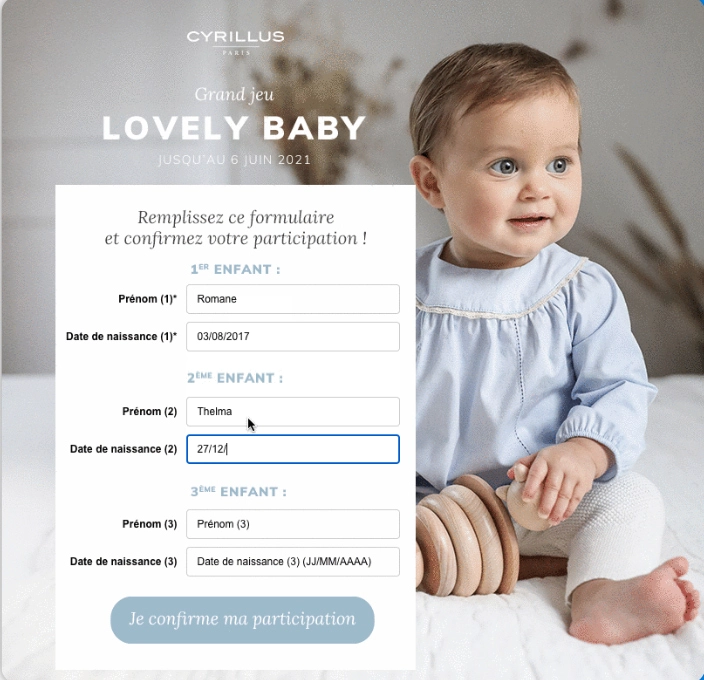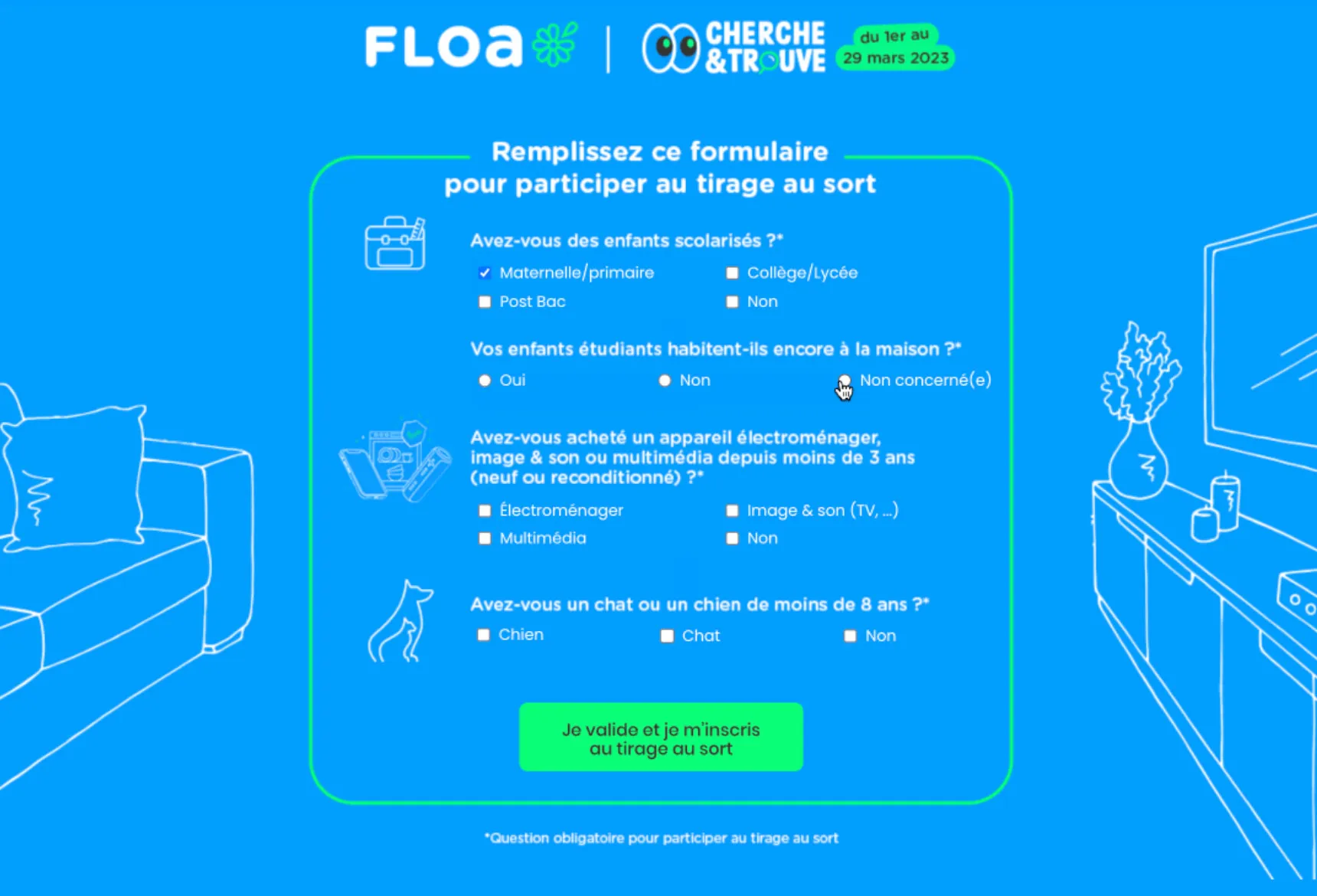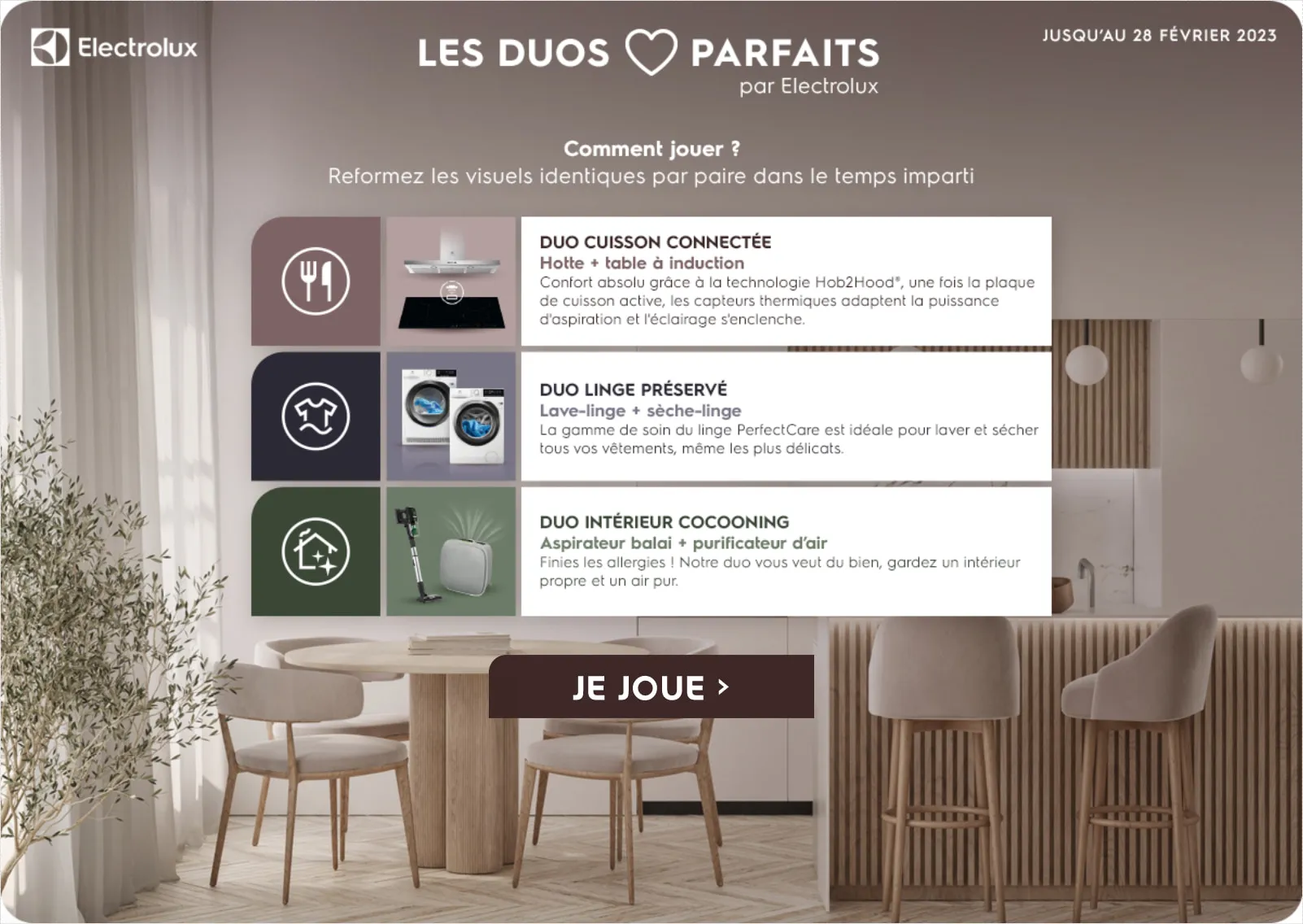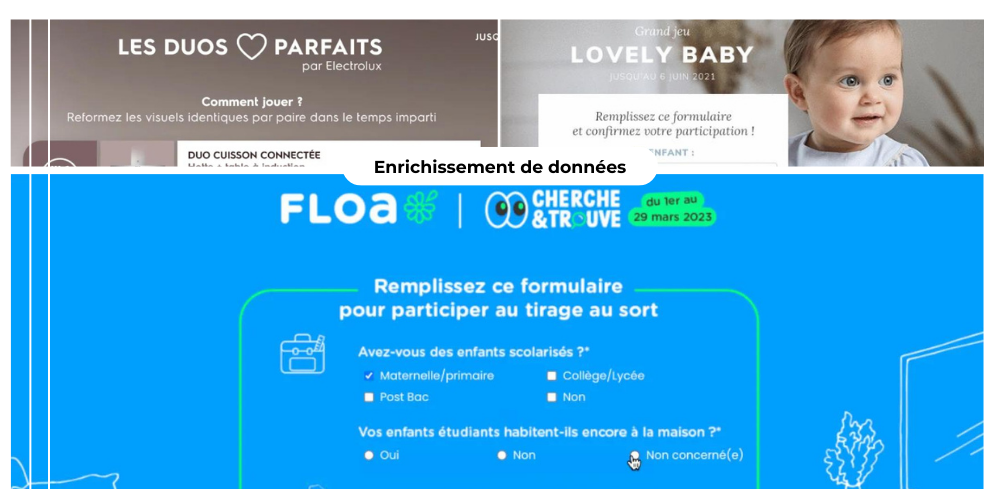In a constantly evolving digital world, data enrichment has become an imperative for companies seeking innovative ways to improve the quality of their databases. Data collection and enrichment are crucial to understanding customers, personalising offers and improving marketing campaigns. This is true when the end of third-party cookies is approaching, so enriching your database is essential.
In this article, we look at the benefits of data enrichment and how gamification can be a way of achieving your objectives. We will then explore three campaigns run by our customers: Cyrillus, Floa Bank and Electrolux. These examples show us how a data collection strategy has enabled these companies to re-qualify their databases and improve their conversion rates.
Data enrichment: maximising customer understanding
Data enrichment plays a fundamental role in digital marketing, enabling brands to deepen their understanding of customers and optimise strategies. However, as the industry evolves, brands are facing challenges, including the disappearance of the third-party cookies from Google.
An in-depth understanding of our customers.
Third-party cookies are doomed to disappear. This is when first-party and zero-party data, is becoming valuable.
By collecting detailed data in-house, brands can gain an accurate and reliable view of their customer base. This in-depth understanding enables companies to personalise their campaigns, offer tailored products and services and strengthen customer loyalty.
Optimisation of personalisation.
Although 37% of users refuse third-party cookies, consumers still expect personalised experiences. The solution lies in data enrichment. Collected from consumers, it offers brands the opportunity to optimise the personalisation of their offers.
With customer data, companies can create targeted content, product recommendations and offers tailored to individual preferences. This increases engagement, as well as customer satisfaction.
Improving the effectiveness of marketing campaigns.
Enriched, accurate data enables brands to design effective campaigns, thanks to data segmentation. By understanding the buying behaviours and interests of their audience, businesses can target the right segments, adjust their messages and optimise their budget. The result is better conversion of prospects into customers.
Strengthening customer loyalty.
When brands understand their customers and respond to their needs, they strengthen customer loyalty. Customers feel valued and understood, which encourages them to remain loyal. Personalised offers can encourage customers to make repeat purchases, strengthening the relationship over the long term.
Data enrichment is becoming an asset for brands wishing to remain competitive and establish connections with their customers in an ever-changing digital landscape. By combining first-party, zero-party data and data enrichment, companies can navigate challenges, ensuring strong relationships.
In this new environment, data enrichment is emerging as an essential strategy, but also as the foundation of customer understanding in the digital age.
Gamification for data enrichment
In the digital marketing landscape, gamification is emerging as a strategy for enriching corporate data while engaging users. This clever approach transforms data enrichment into an interactive and rewarding experience, while offering companies opportunities to gather information.
Gamification involves the use of game mechanics such as challenges, rewards and competitions in non-game contexts. By integrating these elements into data collection process, brands can arouse the interest and enthusiasm of users, inviting them to share information.
The interactive games and online competitions, such as quizzes or memory games, can be designed to collect useful data while users are participating. By proposing questions within a quiz linked to a product or service, brands can obtain answers from participants, thereby enriching their customer understanding.
The use of gamification for data enrichment offers a dual benefit: it allows companies to collect data while increasing user engagement and satisfaction. By creating interactive experiences, brands can build deeper connections with their audience, while enriching their database for effective marketing campaigns!
The Cyrillus Interactive Form: exceptional data enrichment

Cyrillus, aiming to reach young mothers, has opted for a campaign based on a form with a prize draw at the end of the game. Thanks to this strategy, Cyrillus succeeded in enriching its database by more than 65%, collecting crucial information such as children’s first names, dates of birth and missing telephone numbers.
This enabled Cyrillus to personalise its offers and optimise its communication. By better understanding the needs of young mothers, Cyrillus was able to tailor its marketing in a targeted way, thereby increasing its conversion rate.
Floa Bank’s enriched form: the power of brand awareness and personalisation

Floa Bank has launched a Hidden Object campaign to boost its visibility and personalise its insurance products. This campaign captivated its participants with an average playing time in excess of one minute. An opt-in rate of 48% was achieved, offering Floa Bank an opportunity to target registered users for future interactions and offers.
With 4 categories of data enriched in a second form, the collection of qualified data has enabled Floa Bank to improve its personalisation and optimise its services to meet the needs of its customers. Using the information collected, Floa Bank has been able to create tailor-made products, thereby strengthening the confidence of its customers.
Electrolux media and Memory: a memorable Valentine’s Day campaign

Electrolux launched an innovative campaign for Valentine’s Day, using the mechanics of Memory combined with media via Adictiz Ads. This enriched first-party data have enabled Electrolux to better understand its customers, optimise marketing efforts and strengthen customer loyalty. The data collected was used to personalise Electrolux’s future messages, ensuring relevance for each customer and increasing conversions.
This 100% winning campaign, offering discount vouchers, generated 1.5 million impressions. The objective was data enrichment, and thanks to this strategy, Electrolux achieved a remarkable opt-in rate of 50.17%.
Conclusion
Data collection campaigns from Cyrillus, Floa Bank and Electrolux illustrate the importance of data enrichment in the world of digital marketing. By using interactive campaigns, they re-qualifyied their databases, improved their visibility and optimised conversion rates.
Integrating gamification is an innovative step for companies seeking to understand their customers. By transforming a process that is perceived as tedious, brands gather information in a fun and effective way!
Intelligent data collection is about the quality of the information gathered. These case studies highlight the effectiveness of well-designed campaigns to enrich its database, paving the way for customer relationships when the collection of third-party cookies will no longer be relevant.










